“Abdul Alim: Legendary Bangladeshi Folk Singer, Cultural Icon, and Pioneer of Bhatiali and Baul Music, Leaves a Timeless Musical Legacy.”
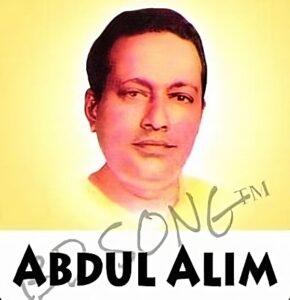
Full Name: Abdul Alim
Born : 27 July 1931
Place : Talibpur, Murshidabad,
West Bengal, British India
Died : 05 September 1974 (aged 43)
PG Hospital, Dhaka, Bangladesh
Occupation(s) : Playback Singer
Instruments : Vocals
Spouse(s):
Begum Jamila Khatun
03 Sons :
Jahir Alim : Azgar Alim
Haider Alim
Four Daughters :
Akhter Jahan Alim : Asia Alim
Nurjahan Alim :Zohora Alim.
About
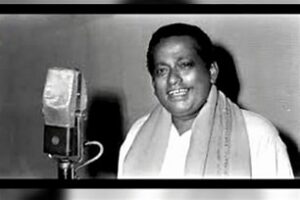
Abdul Alim (1931–1974), a revered Bangladeshi folk singer, was born in the Murshidabad district of British India (present-day West Bengal, India). Later, he relocated to East Pakistan, which subsequently became Bangladesh after gaining independence in 1971.
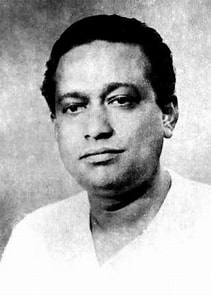
Alim played a pivotal role in popularizing and preserving traditional Bengali folk music, earning widespread acclaim for his soulful renditions of Bhatiali, Baul, and other folk genres, reflecting the rich cultural heritage of Bengal.
His contributions to folk music not only garnered admiration but also played a significant role in the cultural and political movements leading to Bangladesh’s independence in 1971. Despite his untimely passing in 1974, Abdul Alim’s legacy endures through his timeless contributions to Bangladeshi folk music.
Born on July 27, 1931, and leaving a lasting impact until his demise on September 5, 1974, Abdul Alim received the Bangladesh National Film Award for Best Male Playback Singer in 1975 for his work in “Sujan Sakhi.” Posthumously, he was honored with the Ekushey Padak in 1977 and the Independence Day Award in 1997 by the Government of Bangladesh, cementing his legendary status in the realm of Bangladeshi music.
Early Life
Abdul Alim, born on July 27, 1931, in Talibpur, Murshidabad, West Bengal, British India, harbored a passion for singing inspired by his father, Mohammad Yusuf Ali.
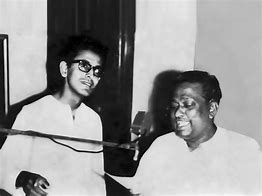
Despite lacking formal musical education, Alim’s musical journey began under the guidance of Syed Golam Ali, where he mastered the art of folk songs.
At the tender age of 13, the budding talent made his inaugural record. Subsequently, he ventured to Kolkata, crossing paths with luminaries like Kazi Nazrul Islam and Abbasuddin Ahmed, creating transient musical collaborations.
Despite the absence of formal music education, Abdul Alim’s profound connection with the folk tradition and his innate talent propelled him to become a legendary figure in Bangladeshi music. His early initiation into recording and encounters with renowned artists marked the inception of a remarkable career that would leave an indelible mark on the cultural heritage of the Bengal region.
Career
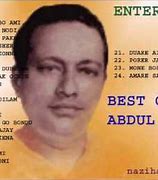
Following the partition of India in 1947, Abdul Alim migrated from Murshidabad to Dhaka, joining the Dhaka Radio Station as a staff artiste. Remarkably, at just 14 years old, he had already recorded two songs. While in Dhaka, Alim received lessons from Mumtaz Ali Khan and Mohammed Hossain Khosru.

His breakthrough came during a performance at the Alia Madrasah in Calcutta, where he earned five gold medals for his exceptional contributions to music at the All Pakistan music conference in Lahore.
Abdul Alim’s prolific career included recording over 300 Gramophone records and providing playback singing for more than 100 films. Notably, he recorded songs for “Mukh O Mukhosh,” the first film produced in the erstwhile East Pakistan, further solidifying his significant impact on the musical landscape of the region.
Personal Life

The wife of Abdul Alim remains unknown, but he is survived by three sons—Jahir, Haider, Asgar—and four daughters—Zohra, Noorjahan, Aktar Jahan, and Asia.

His demise occurred on September 5, 1974, at PG Hospital in Dhaka. In 2015, a comprehensive research book shedding light on his life was published, adding to the documentation of his significant contributions to Bangladeshi folk music.
Abdul Alim’s family, including his children, became part of his enduring legacy, preserving his memory and the cultural richness he championed. The void left by his departure is filled with the continued appreciation for his musical prowess and the impact he had on the music landscape in Bangladesh.
Best five songs of Abdul Alim || Old Bangla Song: Click here.

Works
Notable songs
Ak Achin Pakhi , Ei Je Duniya Kishero Lagia , Shorbonasha Padma Nodi ,
Holudia Pakhi Shonar Boron , Naiya Rey Nayer Badaam Tuila ,
Duarey Aishachey Palki , Amare Shajay Dio Nowshar Shajey , Porer Jaiga Porer Jomi
Mon-e Boro Asha Chhilo Jabo Modina-e , Shab Shakhire Par Korite Nebo Ana Ana
Ujaan Gang-er Naiyya , Nach Re O Kathputli Nach (Urdu), Doyal Tomar Pane Chaiya
Awards
The information you provided outlines the notable awards and honors received by Abdul Alim, the legendary Bangladeshi folk singer:
- Bangladesh National Film Award for Best Male Playback Singer (1975): Recognized for his exceptional playback singing in the film “Sujan Sakhi.”
- Ekushey Padak (1977): Posthumously awarded in acknowledgment of his significant contributions to Bangladeshi culture and folk music.
- Independence Day Award (1997): Another posthumous honor, bestowed in recognition of his outstanding role in the cultural and political movements leading up to Bangladesh’s independence in 1971.
- President’s Pride of Performance Award (1960) by the President of Pakistan: Acknowledged for his remarkable contributions to the field of music.
- Bachsas Awards (1972-1973): Recognition received during the Bangladesh Film Awards for his noteworthy contributions to the film industry during the specified years.

“Abdul Alim: Iconic Bangladeshi Folk Singer’s Musical Legacy.”





